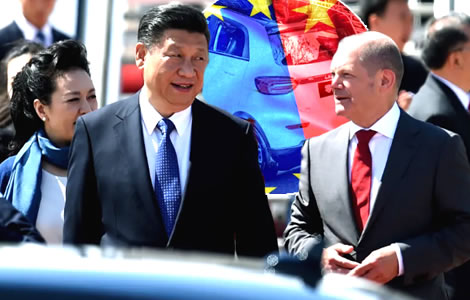EU’s new tariffs on Chinese EVs threaten Germany’s trade ties with China. Germany’s Chancellor Olaf Scholz faces mounting pressure as his country, a major exporter, opposes the decision, which could spark a significant trade war between the EU and China.
Germany’s Social Democrat Chancellor Olaf Scholz faces a dilemma following a vote on Friday by the European Union to impose steep tariffs on Chinese electric vehicles exported to Europe. The decision, which saw both Germany and Hungary, along with some smaller countries, oppose it, was made by a majority of European Union members. The decision follows intense pressure from German industry, including carmaker BMW, to prevent the move. In short, China is a significant export market for Germany, while the decision represents the start of a major European Union-China trade war.

EU member states have voted to impose significant tariffs on Chinese electric vehicle (EV) imports. This decision marks the largest trade dispute between the EU and China in a decade.
The tariffs, which could reach up to 45%, come after an investigation into subsidies provided by the Chinese government to domestic carmakers.
The European Commission’s investigation revealed extensive subsidies, including loans from Chinese banks, that have given Chinese EV manufacturers an unfair competitive advantage. These tariffs, intended to counter those subsidies, could be in place for up to five years.
Europe Takes a Stand Against Chinese EV Expansion
On Friday, a majority of EU countries supported the Commission’s proposal to introduce anti-subsidy tariffs of up to 35.3%. This figure is on top of the existing 10% levy on Chinese EVs. The tariffs target companies such as SAIC, the owner of the MG brand, which faces the steepest rate at 35.3%. Tesla will face a smaller tariff of 7.8%.
The move is a direct response to China’s rapid expansion in the European market. Chinese automakers have been aggressively growing in Europe, where domestic carmakers are struggling to keep up with the production of affordable EVs. While European automakers have been slower to adapt, Chinese companies have capitalised on their lead, taking market share from traditional European brands.
Divisions Emerge Within the EU
The vote exposed deep divisions within the European Union regarding trade policy towards China. Germany and Hungary, two of the largest exporters to China, were vocal opponents of the tariffs. They argued that the move could harm European businesses that rely on Chinese markets. Other countries, including Slovakia, Slovenia, and Malta, joined them in voting against the measure.
Meanwhile, France, Italy, Poland, the Netherlands, and several other EU members backed the tariffs. These countries believe the tariffs are necessary to protect European carmakers from unfair competition.
Spain, whose Prime Minister Pedro Sánchez recently visited Beijing and warned against escalating a trade war, abstained from the vote. By abstaining, Spain effectively gave tacit support to the Commission’s proposal.
China Responds to EU’s Tariffs
In response to the EU’s decision, China has already signalled its intent to retaliate. It has threatened to impose tariffs on EU imports, targeting products like brandy, pork, and dairy. These measures are seen as an attempt to pressure the EU to reconsider its stance.
Disturbing questions that must be confronted over Thailand’s reeling economy are China and EV cars
EV sector crisis as Chinese firms are trapped between lack of demand and government tax penalties
China’s Ministry of Commerce criticised the EU’s decision, labelling the tariffs as “unfair, unlawful, and unreasonable” protectionism. The ministry urged the EU to resolve trade tensions through negotiations rather than imposing punitive measures.
Before the vote, China had offered to limit the number of EVs it exports to the EU and raise prices. However, the Commission rejected this proposal, stating that any alternative solution would need to comply with World Trade Organization (WTO) rules.
German Industry Voices Concerns
Germany, a major player in the global automotive market, expressed concerns about the tariffs. German automakers, which derive a significant portion of their profits from Chinese sales, are particularly worried about the impact on their businesses. BMW’s chief executive, Oliver Zipse, warned that a trade conflict between the EU and China could severely undermine efforts to combat climate change.
The head of Germany’s leading business organisation, BDI, Tanja Gönner, called for continued talks between the EU and China to prevent the trade dispute from escalating further.
Chinese Investments in Europe Continue
Despite the rising tensions, Chinese EV and battery manufacturers have been increasing their investments in Europe. According to research by Climate Energy Finance, Chinese companies have made at least eight major investments in the EU since the beginning of 2023. These include new manufacturing facilities in Hungary by BYD and CATL, the world’s largest EV and battery makers.
In addition to investments within the EU, several Chinese companies are also building factories in nearby countries like Morocco and Turkey. These moves highlight China’s long-term commitment to expanding its presence in the European automotive market, even as trade barriers rise.
A New Chapter in EU-China Trade Relations
certainly, the decision to impose tariffs on Chinese EVs reflects broader tensions between the EU and China. Previously, disputes over cars and agricultural products have escalated. At the same time, Beijing has already launched investigations into EU pork and dairy exports. In turn, the EU has accused China of unfair trade practices in the automotive sector.
The European Commission stated that it remains open to finding a negotiated solution. However, any alternative would need to address the “injurious subsidisation” uncovered by its investigation and be enforceable under international trade law.
The EU’s decision to impose tariffs on Chinese electric vehicles is a bold move to protect its domestic car industry. However, it also risks triggering a trade war with China, one of Europe’s most important economic partners. While the tariffs are designed to level the playing field for European automakers, the potential for Chinese retaliation remains high.
Join the Thai News forum, follow Thai Examiner on Facebook here
Receive all our stories as they come out on Telegram here
Follow Thai Examiner here
Further reading:
EV sector crisis as Chinese firms are trapped between lack of demand and government tax penalties
Thailand changes tack as EV revolution turns into a damp squib with warehouses full of unsold cars
Top Thai insurer says no more new policies for EV cars. Later, it emphasised renewals case by case
Lack of coherence in government policy is the root cause of Thailand’s massive economic problems
Disturbing questions that must be confronted over Thailand’s reeling economy are China and EV cars
First-quarter GDP growth surprises analysts based on higher tourism and consumer spending growth
Central bank holds interest rates. Economy will grow 2.6% in 2024 as Srettha pushes home ownership


















